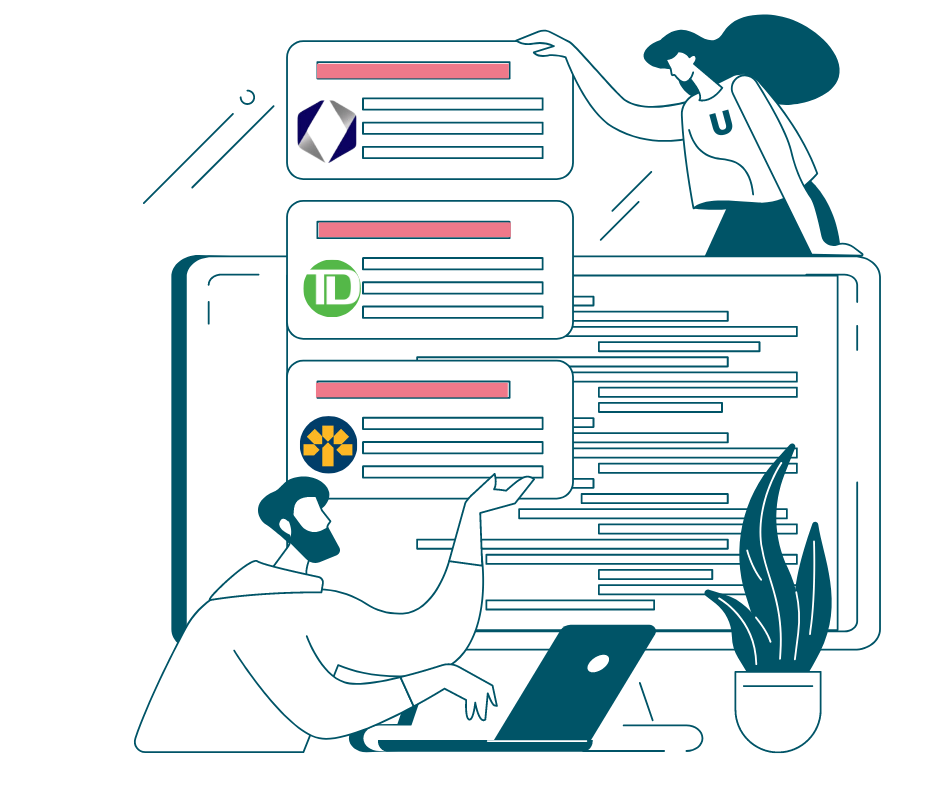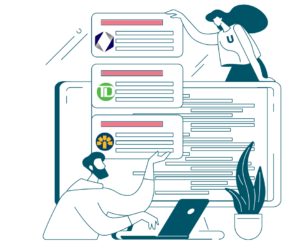Theodore Lowe, Ap #867-859 Sit Rd, Azusa New York

Theodore Lowe, Ap #867-859 Sit Rd, Azusa New York
Shop the best mortgage deals in Canada. approvU allows you to comparison-shop for the lowest rate mortgage deals across 25+ lenders and brands in Canada.

Mortgage Deals
Lenders & Brands
Huge Savings
If you’re looking to reduce your monthly mortgage payment, refinancing your mortgage might be an option to consider.
You can apply for a new mortgage with a lower interest rate and reduce overall mortgage costs.
But it’s important to consider the potential costs and benefits of refinancing before deciding.
In this article, we’ll explore why refinancing your mortgage can be a good way to lower your mortgage payment, what factors to consider before refinancing, and what steps you can take to smooth the refinancing process as stress-free as possible.
By the end of this article, you’ll better understand whether refinancing your mortgage is the right choice for you.
Learn More about Mortgage Refinance: What is to Refinance a Mortgage in Canada?
Refinancing your mortgage typically requires working with a lender or broker to find a new mortgage that better fits your financial goals and needs.
This can involve negotiating new interest rates, repayment terms, loan amounts and associated fees or costs.
You must qualify for the new loan to enjoy the special benefit of lower mortgage payments through refinancing.
This means meeting certain eligibility criteria, such as having a good credit score and sufficient income to support the new mortgage payments.
In addition, you’ll need to provide documentation of your income and assets and have an appraisal completed on your property to determine its current market value.
Once you’re approved for refinancing, the new mortgage funds will be used to pay off your existing mortgage. Then, you’ll start making payments on the new loan according to the agreed-upon terms.
There are different ways to refinance a mortgage, including:
Early termination of a mortgage contract involves cancelling your current mortgage and signing a new one with another lender. This is typically done to take advantage of better interest rates or terms available with the new lender.
However, keep in mind that breaking your mortgage before the end of the term can result in prepayment charges. These are fees that compensate the original lender for lost interest income.
The amount you’ll be charged for prepaying your mortgage early will depend on the type and terms of your mortgage.
It can be a significant amount, so it’s important to carefully review your mortgage contract and understand the potential costs before deciding to terminate your mortgage early.
It’s also important to make sure that you’re financially prepared to take on the costs of a new mortgage, including closing costs and other fees.
Additionally, it’s essential to compare the interest rates, terms, and other features of the new mortgage with your existing mortgage to determine if the benefits of early termination outweigh the costs.
Refinance your Mortgage Online: approvU for Mortgage Refinance
If you want to access the equity in your property without replacing your entire mortgage, a Home Equity Line of Credit (HELOC) might be a good option. It’s similar to a standard line of credit, but it’s secured against your home, which means you’ll only be charged interest on the amount you’ve borrowed.
One advantage of a HELOC is that the interest rate is typically lower than that of a comparable personal line of credit or credit card because your home secures the loan.
However, keep in mind that the HELOC can put your home at risk if you’re unable to repay the loan.
HELOC is a flexible option for accessing funds, and it’s also a good way to avoid prepayment charges in terminating your mortgage contract early. But it’s important to have a solid plan for repaying the loan and carefully consider the potential risks and benefits before getting a HELOC.
Learn More: Home Equity Line Of Credit (HELOC) In Canada Best Explained
Again, if you want to access your home’s equity without worrying about high prepayment charges or the risks associated with a HELOC, consider the Blending and Extending refinance option.
Here’s how it works: in a Blending and Extending refinance, your existing mortgage rate is blended with your lender’s current rate for an equivalent mortgage, and the loan term is extended.
Let’s say your mortgage has three years left, and you want to blend and extend it to a new five-year term. Your new mortgage rate will be the average of the lender’s current five-year term mortgage and your existing mortgage rate.
The blending happens because your new interest rate is a combination of your current mortgage rate and the lender’s five-year term rate.
The extension happens because your mortgage’s term is extended to a new period. Your mortgage will be extended from three to five years in this example.
Note that the formula for calculating the new blended rate is more complex than this simple illustration, but it gives you an idea of how it works.
Learn More: Blended Mortgage In Canada; Plain And Simple
Home Equity Loan or a Second Mortgage is an alternative way to cash out on the equity in your property without necessarily changing the terms and conditions of your existing mortgage contract.
The Home Equity Loan lets you borrow money based on the equity you have in your home.
This equity is the difference between your home’s current market value and your property’s outstanding balance mortgage. For example, if your home is currently worth $500,000, and you have an outstanding mortgage balance of $300,000, your equity is $200,000.
You can use the funds from a Home Equity Loan for any purpose, such as home improvements, education expenses, or consolidating high-interest debts.
One significant advantage of a Home Equity Loan is that you can access funds without paying the high prepayment penalties for breaking your first mortgage.
Additionally, a Home Equity Loan lets you maintain your first mortgage at its current interest rate and terms.
However, Home Equity Loan typically has a higher interest rate than your primary mortgage. Its repayment term is also usually shorter than a traditional mortgage.
Lastly, your home is used as collateral, so it’s important to make timely payments or risk foreclosure on your home.
Learn More: Second Mortgage: Everything You Need To Know
See Your Personalized Mortgages Online With approvU

Homeowners often refinance their mortgage for the following reasons;
Refinancing your mortgage for a lower interest rate can help you lower your monthly payments.
However, you should note that breaking your mortgage before the end of its term may result in a prepayment charge. This charge compensates the lender for the lost interest income due to early mortgage termination.
Refinancing your mortgage can also let you cash out the equity in your home, which can help improve your financial situation.
To cash out on your home’s equity, you’ll borrow against the difference between the value of your home and the amount of your outstanding mortgage debt, up to 80% of your home’s appraised value.
You can use the money you receive from cashing out on your home’s equity for various purposes, such as the down payment for a new home, investing in rental properties or other assets, paying for tuition fees or medical bills, or even paying off bankruptcy.
But borrowing against the equity in your home does come with risks. It can increase your overall debt load and put your home at risk if you’re unable to repay the loan.
Before deciding to cash out on your home’s equity, it’s essential to carefully consider the potential risks and benefits and ensure that you have a solid plan for repaying the loan.
Learn More: Cash-Out Refinance In Canada, Best Explained
Another reason to consider refinancing your mortgage is to consolidate your debts.
Refinancing allows you to combine your high-interest unsecured debts, such as car loans, credit cards, student loans, and Canada Revenue Agency debts, into a single, low-interest mortgage loan.
This can lead to significant savings on interest expenses and make it easier to manage your monthly finances with just one payment instead of multiple payments.
You want to weigh the benefits and risks of consolidating your unsecured debts with your house. Consolidating your debts with your home increases the risk of losing your house, so it’s important to make sure you can afford the new loan and have a solid plan for repaying it.
Learn More: Debt Consolidation Mortgage In Canada
See Your Personalized Mortgages Online With approvU

While there are no right or wrong reasons for refinancing your mortgage, it’s important to consider the long-term financial implications of such a decision. Some reasons for refinancing may not be as beneficial as others, including the following:
Taking out equity for non-essential expenses: Refinancing to take out equity in your home for non-essential expenses, such as vacations or luxury purchases, can put your home at risk and increase your overall debt load.
Short-term financial gain: Refinancing to get a quick infusion of cash may provide temporary relief but can result in higher long-term costs and reduced financial stability.
Extending the loan term: While refinancing to extend the loan term can result in lower monthly payments, it also means paying more interest over time, which can be costly.
Refinancing your mortgage for a lower payment can be a smart financial move.
By applying for a new mortgage with a lower interest rate, you can reduce your monthly mortgage payments and save money in the long run.
However, it’s essential to consider the potential costs and risks of refinancing, such as prepayment charges or extending your mortgage term.
To make the refinancing process as smooth as possible, be sure to shop around for lenders, compare interest rates and fees, and have all the necessary documentation ready.
With careful consideration and preparation, refinancing your mortgage can help you achieve your financial goals and give you greater peace of mind.
